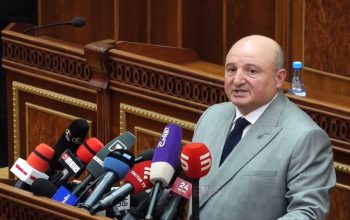A 34-year-old judge overseeing the new trial of former President Robert Kocharyan revealed on Thursday that he had been affiliated with Prime Minister Nikol Pashinyan’s party before taking the bench five months ago.
Judge Sargis Petrosyan downplayed the significance of his past affiliation, stating that it does not affect his impartiality in the case, particularly against Kocharyan, leader of the main opposition Hayastan alliance.
Kocharyan, his former chief of staff Armen Gevorgyan, and two retired army generals are being prosecuted once again for their roles in the violent aftermath of the 2008 presidential election in Yerevan. They were previously acquitted of charges of “overthrowing the constitutional order” by another judge in April 2021, after Armenia’s Constitutional Court ruled that the accusation was unconstitutional and politically motivated.
Prosecutors appealed the acquittal, arguing they should be allowed to bring a different charge related to the March 2008 events, which led to the deaths of eight protesters and two police officers. The Court of Cassation approved the new trial in September. Kocharyan condemned the decision as “disgraceful” in remarks to journalists following the latest hearing.
During the court session, Kocharyan and his legal team requested that Judge Petrosyan recuse himself due to his past ties to the ruling Civil Contract party, citing concerns over potential bias. Petrosyan, however, rejected the demand.
He acknowledged that he had been a member of Pashinyan’s party “for several months” and had run for parliament on its ticket in 2018, just before becoming a prosecutor. “I have never held a political position,” he explained, adding that his involvement was intended to leverage his legal expertise.
After being acquitted of the coup charge in 2022, Kocharyan still faced trial on a separate corruption charge. This trial ended without a verdict in December, with Kocharyan invoking the statute of limitations, which expired in May 2023.
Anna Danibekyan, the judge who presided over the corruption case, was controversially removed from the bench in July. Armenia’s Supreme Judicial Council (SJC), led until recently by Pashinyan ally Karen Andreasyan, accused Danibekyan of allowing Kocharyan to delay the hearings.
Andreasyan, along with five other senior officials, resigned on November 18, three days after Pashinyan publicly criticized Armenia’s courts and law enforcement for what he deemed a persistent lack of “justice.” Pashinyan stated that he had “asked” Andreasyan to step down due to dissatisfaction with some court decisions, citing cases that had been “dragging on for years.”
Opposition leaders and critics argue that Andreasyan’s departure demonstrates that the SJC, meant to safeguard judicial independence, is actually controlled by Pashinyan.




